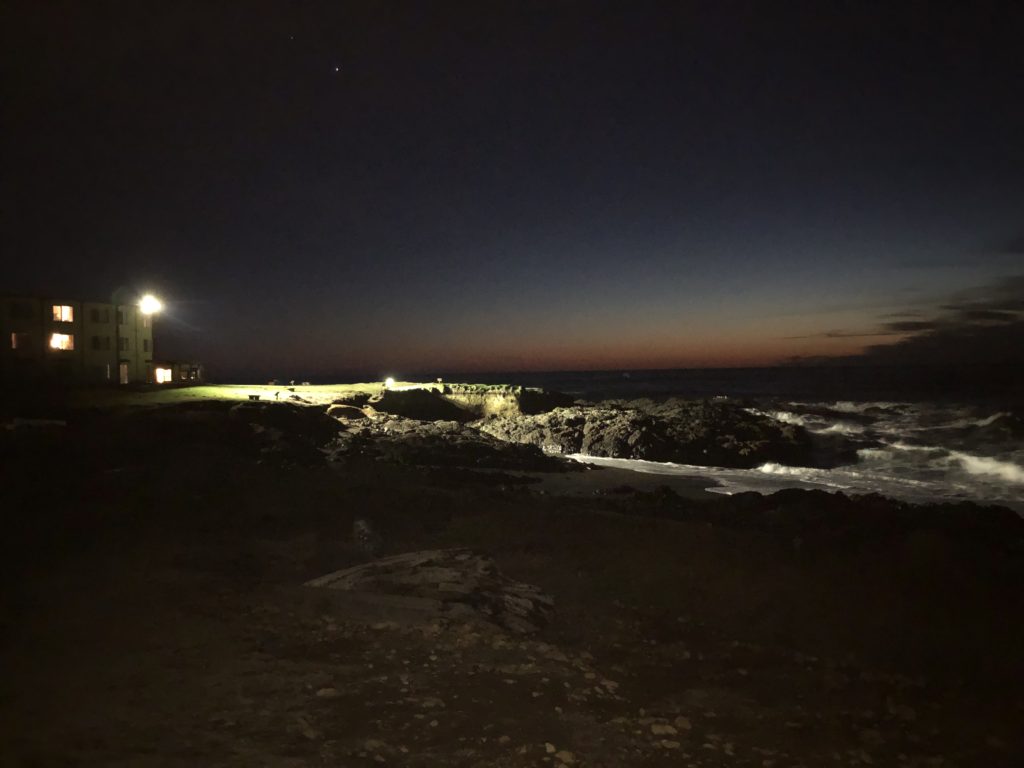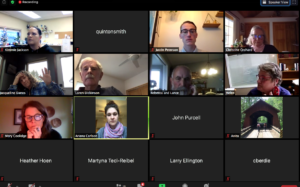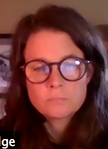
By QUINTON SMITH/YachatsNews.com
After months of back-and-forth with the City Council, the Yachats Planning Commission on Thursday voted 4-1 to recommend that all marine lighting in the city be prohibited after one year.
The commission has been working on the ordinance for 18 months. It is the fourth time the commission has sent its recommendations to the council, only to have a 13-page ordinance amending residential and commercial lighting sent back for reconsideration.
The biggest issue has been marine lighting, including some on homes overlooking the ocean, but primarily those shining from the Adobe Motel and Overleaf Lodge.
In the previous version of the proposed ordinance, the Planning Commission recommended that all marine lighting be banned but gave the owners of the Adobe and Overleaf three years to find another way to light their grounds – without shining on the ocean.
On Thursday, four members of the commission said studies and news stories on the effects of artificial light on marine life it had received from the International Dark Sky Association convinced it that the lights needed to go sooner.

Voting for the ordinance were chair Lance Bloch, Loren Dickinson, Christine Orchard and Jacqueline Danos. Helen Anderson voted no; Ariana Carlson abstained, saying she would have preferred a two-year compliance period.
The commission also recommended that during the one-year compliance period, the motels’ lights would have to be turned off at 9 p.m. during months when Oregon is on Pacific Standard Time and 11 p.m. during Daylight Savings Time.
Previous versions of the proposed ordinance had a light curfew at 11 p.m. year round.
The general manager of the Adobe told the City Council in November that its owners were opposed to the ban, that the lights were needed for safety, and the illuminated waves at night was popular with guests. The owners also threatened to fence off access to the popular 804 Trail for safety reasons if the lights were banned.
The Overleaf owner also opposed the ban, but said a curfew was acceptable.
Representatives of either motel did not attend Thursday’s online commission meeting.

But invited was Mary Coolidge of Portland, a board member of the Oregon Chapter of the International Dark Sky Association who in December gave the commission and City Council 10 selected studies or news reports on the effects of marine lighting. She urged the commission to cut the three-year grace period to one year.
“Any light after sundown is going to have impact,” said Coolidge said.
Coolidge also reminded the commission that all the marine lights in Yachats were already in violation of a separate nuisance code that prohibits lights from shining onto someone else’s property – including the state-owned shoreline. It just hadn’t been enforced.
“It seems that the Adobe has been enjoying some immunity from the nuisance code,” she said.
Orchard agreed.
“I like what Mary said that anything we do is a capitulation to commercial interests,” she said.
Coolidge and most commission members also disagreed with the Adobe’s contention its lights were needed for safety. The motel has one large light atop its roof shining onto the grass to the west side of the motel; three other lights – a fourth is not working – illuminate the rocky ledge and water where guests cannot walk.
In contrast, Danos and Carlson said the Overleaf had subdued, ground-level lighting for its pathways and public areas which enhanced safety without lighting up everything.
In voting against the shorter compliance period, Anderson said she favored the previous 3-year deadline to give motels time to adjust and that the commission and council needed to get wider feedback from the community.
“This is a huge decision for the community and I want to see more support for it,” she said. “I also want to hear from the council that they want to move to ‘dark skies’.”
Danos said the recommendation wasn’t a ‘dark sky’ ordinance, but a lighting ordinance focused on the environment.
“We’re giving them time, we’re giving them notice,” she said.
The commission asked city staff to clean up editing and language in the recommended ordinance and ask to get it on a City Council agenda in March.




Should include the rentals.